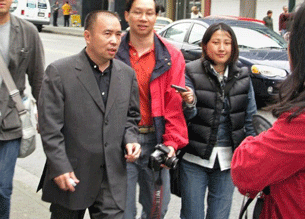Canada to deport fugitive
| Publisher | Radio Free Asia |
| Publication Date | 22 July 2011 |
| Cite as | Radio Free Asia, Canada to deport fugitive, 22 July 2011, available at: https://www.refworld.org/docid/4e3904dec.html [accessed 4 November 2019] |
| Disclaimer | This is not a UNHCR publication. UNHCR is not responsible for, nor does it necessarily endorse, its content. Any views expressed are solely those of the author or publisher and do not necessarily reflect those of UNHCR, the United Nations or its Member States. |
2011-07-22
Nearly 600 Chinese suspects are at large overseas, wanted mostly for graft.
 A file photo dated June 1, 2006 shows Chinese fugitive Lai Changxing (L) speaking to reporters in Vancouver, Canada. AFP
A file photo dated June 1, 2006 shows Chinese fugitive Lai Changxing (L) speaking to reporters in Vancouver, Canada. AFP
As China faces expanding official corruption at home, a Canadian court has ruled to allow the extradition of a former top businessman for bribery.
A federal court in the Canadian city of Ottawa upheld on Thursday a deportation order against Lai Changxing, who is the nation's most-wanted fugitive for his alleged role in a massive smuggling scandal.
The official Xinhua news agency said the smuggling operation in the southeastern port city of Xiamen was valued at U.S. $10 billion.
No further legal proceedings are possible for Lai, who has been in Canada for 12 years since arriving with his family on a tourist visa.
He has been refused permission to remain in Canada as a political refugee, but has been granted the right to work while he fights his extradition.
Lai should now normally be repatriated under Canadian law, although officials declined to give a date, citing security and confidentiality.
Previously, his extradition was blocked because China has already executed some of those involved in the scandal, and Canada is bound by its own laws not to extradite people to countries where they could face the death penalty.
Beijing, however, gave assurances in 2007 that Lai wouldn't be executed. However, prisoners serving labor camp sentences have also died.
Ruling welcomed
Chinese Foreign Ministry spokesman Ma Zhaoxu said in a statement shortly after the verdict that China welcomed the ruling.
"The Chinese government's position is very clear that Lai should be deported to China and put on trial," Ma said.
If he returns to China, Lai will face charges of smuggling, bribery, and tax evasion.
Lai's business empire, the Yuanhua Group, was accused by Beijing of bribing officials to allow a massive smuggling ring in a scandal that implicated more than 200 senior figures.
The authorities have put more than 300 suspects on trial and sentenced 14 to death, including a former vice minister of public security, in a case Beijing has used for a propaganda campaign against corruption, according to reports.
Police statistics in 2010 showed that there were nearly 600 Chinese suspects at large overseas wanted for economic crimes, mostly graft.
However, Wang Youjin, visiting Hong Kong lecturer at the China University of Politics and Law, said Lai's case wasn't yet closed.
"I don't think that the question of Lai Changxing's extradition is closed yet," Wang said. "It touches on a lot of political issues."
"There is still room for maneuver in this decision by the court, and this will become clear over the next few days," he added.
'Opportunities for corruption'
Meanwhile, experts said China's fight against graft back home is barely scratching the surface of the problem.
Wu Fan, editor in chief of the overseas Chinese-language magazine Chinese Affairs, said widespread government spending on infrastructure projects in the wake of the global economic crisis have sparked a property bubble which in turn is fueling official corruption.
"These projects take up a lot of money ... and there are many, many opportunities for corruption," Wu said.
"When there is fat to trim, anyone can put their hand in the till."
"The more the Chinese Communist Party tries to fight corruption, the more corruption there will be, and the more extreme that corruption will get."
Wu said the age of corrupt officials is now getting younger and younger.
"Nowadays, even the lowly section chiefs are on the take," he said. "Everyone does it; there isn't a single official that doesn't."
A recent article in Beijing's Xinjing News said corruption isn't only linked to property transactions, however.
It said corrupt transactions have now taken over regular business as the priority in many areas of the communications industry and the judiciary.
It added that the system of requiring officials to declare their assets publicly is still unreliable, as the reporting process itself isn't supervised.
'Systemic problem'
Lili Yang of the U.S.-based Laogai Research Foundation said anti-corruption campaigns in China up until now have taken the form of more and more rules issued by higher levels of government.
"Basically, this is a systemic problem," Yang said. "There are reports of corruption pretty much every day, in shocking numbers."
She said the only way to have the government supervised would be through a system of checks and balances within the government.
"They haven't taken such measures as [allowing] freedom of the press and freedom of expression, which would have a real effect in preventing corruption from happening or from expanding," she said.
"Instead, they just make a bit of a fuss and go through the motions."
Reported by Xi Wang for RFA's Mandarin service, and by Wei Ling for the Cantonese service. Translated and written in English by Luisetta Mudie.
Link to original story on RFE/RL website
